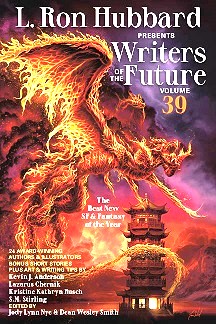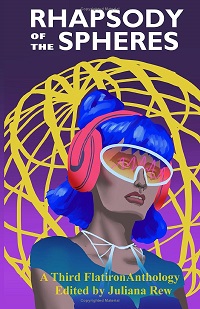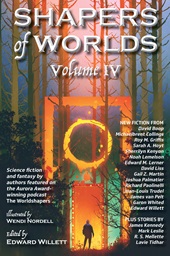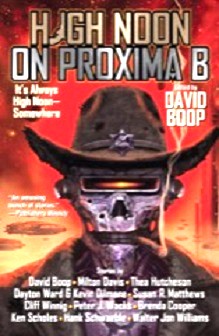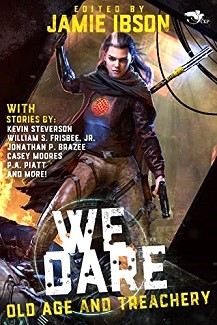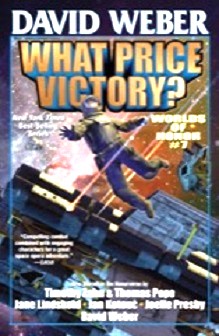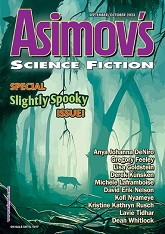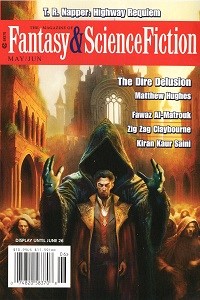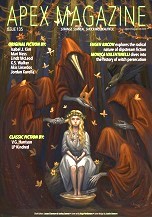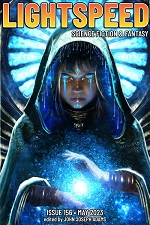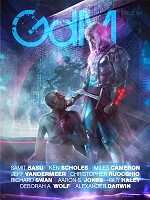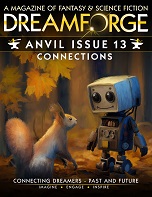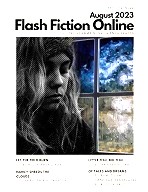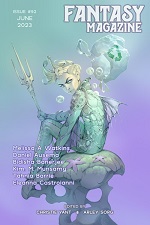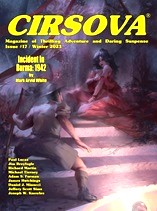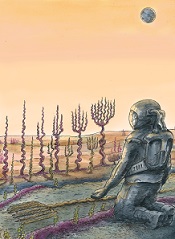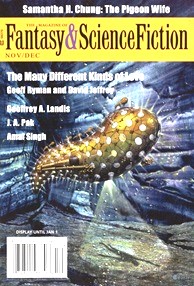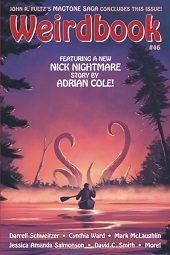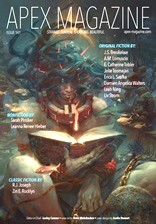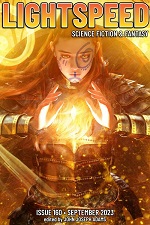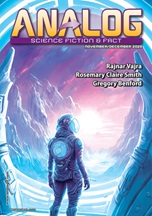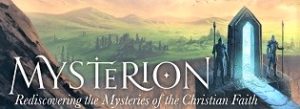Tangent Online 2023 Recommended Reading List
A Question of Balance

 For the most part, the literary aspect of the science fiction field proceeded as usual in 2023; the general machinery operated well enough to keep the magazines and books appearing on reasonable schedules, and SFWA (the Science Fiction and Fantasy Writers Association, formerly for decades since its 1965 inception the Science Fiction Writers of America) the field’s one and only member-funded 501(c)(3) tax exempt administrative organization, was still alive and kicking, though to my mind and due to external “real world” politics, took a wrong turn that gave the outside world an entirely misleading picture of the organization as a literary organization, but instead revealed its political advocacy (or lack thereof) on any given issue.
For the most part, the literary aspect of the science fiction field proceeded as usual in 2023; the general machinery operated well enough to keep the magazines and books appearing on reasonable schedules, and SFWA (the Science Fiction and Fantasy Writers Association, formerly for decades since its 1965 inception the Science Fiction Writers of America) the field’s one and only member-funded 501(c)(3) tax exempt administrative organization, was still alive and kicking, though to my mind and due to external “real world” politics, took a wrong turn that gave the outside world an entirely misleading picture of the organization as a literary organization, but instead revealed its political advocacy (or lack thereof) on any given issue.
For a number of years now the literary SF field (primarily magazines but inclusive of conventions as well) has undergone an incremental series of highly detrimental changes, the singular cause being the intrusion of real world politics into the field as never before in its long history. To explain how I have arrived at this observation I will need to set the stage with a brief mention of one of the field’s early fan clubs and the genre’s first World Science Fiction Convention in 1939, and then by noting that females were never excluded from any SF-related activity because of their gender and were present at the beginning of the genre (writers, fans, editors), by way of dispelling the false myths that the field has always been sexist (using the false metric of pure numbers to prove this sexist claim), and that pervasive politics inside the SF field has always been with us, claims much believed in both cases through decades of repetition and a time proven modus operandi certain Real World political ideologies have used with an Us against Them strategy to attain its goals by first winning the hearts and minds of potential new members to its causes. Following this and other related commentary the expected introduction and the year’s recommended reading list can be viewed as usual.
Politics has entered the SF field directly but sporadically over the past 97 years, since its official birth as a genre began with the April 1926 issue of Amazing Stories. Early readers became fans when they corresponded with others through letter columns, and small SF fan clubs began to sprout all over the country. The first SF worldcon was held July 1-4, 1939 in New York City, to coincide with the World’s Fair in the same city. Attendance was in the dozens and many of the members were in their teens. Sam Moskowitz (later to become SF’s premiere historian) chaired, with a few of his friends, this first worldcon at the ripe old age of 19. A group of SF fans known by their club name of the Futurians, led by Donald A. Wollheim (later founder of DAW Books), Frederik Pohl, C. M. Kornbluth, Doc Lowndes, and a few others were at odds with Moskowitz’s group and wanted to attend the worldcon. Many of these young SF fans were fashionably members of the local socialist or communist branches; it was the cool thing to do at the time. Without getting into the details (there were many different accounts given from both sides) the Moskowitz faction turned the Wollheim, Pohl faction (the Futurians) away and were thus excluded from the convention. This became known in fandom and the early fan press as “The Great Exclusion Act.” Wollheim and Pohl, among others were either in their teens (C.M. Kornbluth 14 or 15, Pohl 19) or early twenties (Wollheim 24, Doc Lowndes 22) and full of headstrong piss and vinegar. That the feud between fan groups and the turning away of some from the worldcon was primarily because of politics was downplayed by Pohl when he wrote in his autobiography The Way the Future Was, “We pretty nearly had it coming,” and then, “What we Futurians made very clear to the rest of New York fandom was that we thought we were better than they were. For some reason that annoyed them.”
So in essence what amounted to an early fan feud between SF fan clubs whose members were still in their teens or early twenties and had little to do with politics, has somehow become the one size fits all go-to argument that supposedly proves politics has always been a part of SF and SF fandom and is thus nothing new. In a strict sense this is true, but hardly accounts for the wholesale intrusion of cultural marxism infecting the entire field today. Aspects of cultural marxism can be seen in the weaponization of language, where the otherwise use of common words—now verboten under Marxist protocols—are used against the speaker or writer. A prime example occurred in 2013, when a situation occurred that led to the resignation of the SFWA Bulletin‘s editor (a woman) and two longtime columnists (the late Mike Resnick, and Barry Malzberg) who were likewise forced to end their long-running column, and eventually not long afterward, the suspension of the Bulletin itself for the first time in its history. The blowback from this unfortunate series of events occurred when the following petition was posted in early 2014 and was signed by many of the most revered SF authors in the field (including republicans, democrats, independents, and even an avowed socialist) here, whereupon the fallout from this exposé received its own vitriolic response. This sad occurrence far outstripped the political divide over the Vietnam War, that saw its public expression as a full two-page ad in the June 1968 issue of Galaxy magazine, where authors took sides for or against the war. But this political split, while heated at the time, came and went and didn’t prohibit any author or editor from writing or publishing any darn story they wanted to. Not so today, I’m afraid. The weaponization of language and the ability to enforce speech codes (I’m sorry, this story isn’t for us, is but one example) has the SF field in such a state that its authors are afraid to take the kinds of dangerous or controversial chances in their stories that over previous decades greatly aided in defining the field itself as one of experimenting with bold new ideas. To the casual reader this soft censorship of omission may not become readily apparent, but for regular, longtime, diehard fans and readers, it finally becomes obvious that when in those stories dealing with cultural or outright political issues—whatever percentage that may be–only one side is invariably treated in a positive light. And purely on a literary level this redundant and unimaginative treatment of issues or themes becomes predictable and quickly boring, boredom leading to no real incentive to turn the page to discover what comes next, and a sure death knell for any regular, intelligent reader of the SF genre.
Here is an example most often brought up when discussing this issue. It’s a Philip K. Dick story from the October 1974 issue of F&SF and is titled “The Pre-persons.” Published at close to the height of the feminist movement in the real world as well as in the SF world, the story promoted a Pro-Life stance in direct opposition to the Pro-Abortion movement sweeping the country. Strident feminist SF author Joanna Russ wrote Dick a nasty letter, one of the nastiest he ever received according to him. The point is, however, that while it stirred controversy it was allowed to be published. Would an obviously Pro-Life SF story be accepted by most top shelf (or mid-range pro or semi-pro) SF magazines today? I seriously doubt it. Though only one example there are others, but you get the point. Could a story not blaming climate change as a man made phenomenon be written today, and which actually proposes a solution to climate change instead of writing yet another by-the-book apocalyptic story where the astute reader knows how it will turn out? Could a story be sold today decrying the openness of the United States open southern border, and following characters working to close it for the well being of the country? Could a story be published today if it extolled the virtues of big corporations or big oil or big pharma? It doesn’t matter if one is for or against any given subject, as long as stories from differing viewpoints are given the opportunity to see print. Under the current political climate where political correctness has been taken to a whole new level, I seriously doubt magazine editors would publish any story professing a viewpoint contrary to what is considered Woke or Progressive, for the backlash would be immediate and enormous. Oh, I’m certain some editors would swear up and down they would publish any story with any viewpoint on any topic if it was “well written,” but that’s the rub, isn’t it? The proof is in the pudding and not what any editor is bound to proclaim as their willingness to publish anything if well written. Ask them to point to all the stories they have published over the past number of years dealing with hot button cultural or political issues from a decidedly non-progressive or non-woke viewpoint. Heaven knows many current editors will publish just about anything if it promotes the accepted narrative from a progressive point of view (even if not quite written to a high standard, but still of publishable quality).
A perfect example of a magazine editor going the extra mile to publish stories of a certain, approved narrative, while buying into the easily dismissed assertion that women couldn’t write “hard” SF, took magazine form first in 2014 when the first of 9 issues of three magazines, in “special” issues, hit the internet between that year and 2017. All 9 issues were born from the same publisher, with a 4th “special issue” of an SF magazine appearing in 2018 from a different SF magazine editing team. The first of these special issue magazines was titled Women Destroy Science Fiction. Its genesis arose when someone found a blog or forum or website where a couple of male Brainiacs were complaining that women couldn’t write “hard” SF, a proposition so absurd that a sad shake of one’s head should have been the only proper response to the comment. But it was too good a comment not to take advantage of, for at least partial proof that SF was indeed a sexist field where women were not really accepted. It is a given that anything can be found on the internet, regardless of how devoid of intelligence, and can be used to support the pro or con viewpoint of any topic. But to extrapolate the musings of a couple of ignoramuses to at least intimate that their view was widespread in the SF field was not only dishonest but did a disservice to the vast majority of males in the field and to the genre as a whole. It’s too bad that the publisher of this first Somebody Destroys SF special issues didn’t have the good of the field as his top priority, but his allegiance to the political ideology where virtue signaling held dominance, first and always, and at any cost. It would appear that this publisher forgot or ignored one of the basic dictums of social dialectic, made forever famous with the following line:
“Don’t condemn a whole group of people, for the actions of a few.”

–Mike Evens as Lionel Jefferson to Archie Bunker in the All in the Family episode from Feb. 17, 1971.
That first Women Destroy SF issue held stories solely by women as you might imagine, along with articles and personal anecdotes where they had experienced incidences of sexism in SF over the years, either at an SF convention or breaking into the early male dominated field as writers. Again, some complaints were overheard slights, while some were of a more generalized nature. If these occurrences happened as reported then they shouldn’t have happened, period. Wrong is wrong. But the point here is that, again, these were the actions of a few, and nowhere near the entirety of the SF genre experience. I have personally never experienced an instance of sexism at an SF convention of any type. My first con was in 1974. 2024 will be my 50th year of attending SF conventions of all stripe: local, regional, national; Worldcons, Nebula Award weekends from Los Angeles, to Kansas City, to New York, World Fantasy Award conventions from Monterey, CA to Corpus Christie, TX, and specialty literary cons like Readercon in Boston, MA. Nowhere have I ever seen or heard a sexist remark or observed an obvious unwanted encounter between a male and female. This is not to say that over a 50-year time span and many conventions across this country that these things never occurred, but only and more importantly, that they would be in the overwhelming minority, and certainly not indicative of the whole field as some would lead outsiders to believe. (As an aside, the claim that men can’t write a good love scene has also been leveled a few times over the years, but no rush to produce special issues of magazines proclaiming Men Destroy Romance in SF have been on the drawing board as of this writing.)
The ostensible reason for the Women Destroy SF special issue, while weak, was at least there. However, no such reason, weak or otherwise, existed for any of the rest of the Destroy issues. All told, each of the three magazines by the aforementioned same magazine publisher saw a Women Destroy SF, Queers Destroy SF, and People of Color Destroy SF issue, with one issue each to follow for Queers and People of Color Destroy Fantasy, and then Horror, while the final special issue from another magazine publisher continued the virtue signalling with a special Disabled People Destroy SF issue. The SF field at any level has never excluded any of these so called “under represented” or “marginalized” categories, yet these special “victim” magazine issues were produced, the latter not even asking for proof of the qualifying disability for inclusion in the issue. Far from anyone or institution in the SF field excluding any of these groups, the science fiction world has always welcomed every person who has found their way to it. The SF community at large has always been the true “safe space” for anyone wishing to take a break from the sometimes harsh and unrelenting or even unfair realities including prejudices and bigotry of the outer world. Within the ![]() SF community is a kinship of like-minded souls, brought together with the common bond of the SF experience where new friends may be made, sometimes for life, regardless of what brought them to SF. The late, great, and much beloved Leigh Brackett summed it up nicely when asked if she ever—as a woman—encountered any problems in the SF world back in the 1930s, 40s, and 50s: “There certainly wasn’t with me. They all welcomed me with open arms. There were so few of us nuts that they were just happy to receive another lamb into the fold. It was simply that there wasn’t many women reading science fiction, not many were interested. Francis Stevens sold very fine science fiction stories to Argosy back in 1917, back around that period.”
SF community is a kinship of like-minded souls, brought together with the common bond of the SF experience where new friends may be made, sometimes for life, regardless of what brought them to SF. The late, great, and much beloved Leigh Brackett summed it up nicely when asked if she ever—as a woman—encountered any problems in the SF world back in the 1930s, 40s, and 50s: “There certainly wasn’t with me. They all welcomed me with open arms. There were so few of us nuts that they were just happy to receive another lamb into the fold. It was simply that there wasn’t many women reading science fiction, not many were interested. Francis Stevens sold very fine science fiction stories to Argosy back in 1917, back around that period.”
Over its almost 100 years of existence, SF has brought people of all genders, skin colors, sexual orientations, and religions together. Only fairly recently has a political group, at first welcomed into the SF world, sought to divide the community via a rigid authoritarian political philosophy that to survive must create a victim versus oppressor mentality, so uses the SF genre’s openness to subvert it to the primary goal of ultimate political rule. Such is the goal of the cultural marxism that has infected the genre. And the consequences of this are beginning to reach critical mass in 2023, especially for a writers’ organization where freedom of thought and expression should take precedence above all else, and not blind adherence to the imported doctrines of political correctness. This should appear as obvious as the nose on one’s face if one is familiar in the least with how marxism works, but evidently far too many in the SF community (mostly younger I am guessing) know next to nothing of this insidious political movement and are easily persuaded by its often seductive window dressing and false promises.
 To put a bow on the subject of SF as a sexist genre because so few women wrote for its magazines in the genre’s infancy, I turn to a marvelous classic short story collection edited by Kristine Kathryn Rusch, Women of Futures Past (Baen, 2016). The editor’s reason for the book was to point out that women had been overlooked in certain instances, by not giving them the due they had earned and not for excluding them from the genre (and not only by a few men leaving them off lists and whatnot, but by at least one woman editor). By way of explanation and presenting her evidence, she wrote a lengthy and revealing introduction that is worth the price of the book all by itself. To answer the claim that women didn’t write for the SF magazines due to some form of sexism or other, she quotes from a book written by one Eric Leif Davin. To wit:
To put a bow on the subject of SF as a sexist genre because so few women wrote for its magazines in the genre’s infancy, I turn to a marvelous classic short story collection edited by Kristine Kathryn Rusch, Women of Futures Past (Baen, 2016). The editor’s reason for the book was to point out that women had been overlooked in certain instances, by not giving them the due they had earned and not for excluding them from the genre (and not only by a few men leaving them off lists and whatnot, but by at least one woman editor). By way of explanation and presenting her evidence, she wrote a lengthy and revealing introduction that is worth the price of the book all by itself. To answer the claim that women didn’t write for the SF magazines due to some form of sexism or other, she quotes from a book written by one Eric Leif Davin. To wit:
“Davin discovered ‘at least’ two hundred thirty-three women writers who published a total of 1,055 stories in the science fiction magazines between 1926 and 1965. He lists twenty-six women who edited ‘science fiction, fantasy, and weird’ magazines in the years between 1928 and 1960. Davin, in particular, has done much of the work I initially planned to do, and so much more. His astonishingly well-researched Partners in Wonder: Women and The Birth of Science Fiction 1926-1965, published by Lexington Books in 2006, begins with a list of two hundred and three known women who published in U.S. science fiction magazines between 1926 and 1960.”
And finally, there were far fewer women writing for the early science-fiction magazines because they were writing for the much higher paying slick women’s magazines of the time, and not the paltry .01, or .02 cents per word the SF magazines could pay, if they were lucky.
There is one more topic I would like to address (as briefly as I can) concerning how cleverly marxism can insinuate itself into an organization over time, and without anyone being the wiser. And it is one of the most destructive features of the philosophy to defeat, if not uncovered soon enough. It’s no secret that totalitarian regimes demand total and undivided allegiance to the state. These regimes do not tolerate a divided allegiance—those who worship and/or obey their god are not tolerated, nor is anyone or anything other than the state as the ultimate provider for its children. The state is the be all and end all. Thus we see certain radical regimes destroying every facet of the history of conquered peoples, leaving no trace of their past that takes their focus from the state…Big Brother. Totalitarian regimes have made a cottage industry of adapting their crushing form of government to fit whatever peoples or organizations they attempt to rule. A prime example of this can be seen in radicals demolishing statues of revered men and women in the United States, merely because they do not align 100% with the regime’s dictates. Thus, while Thomas Jerfferson or Abraham Lincoln, for instance, are rightly held in high esteem for the overpowering good they accomplished in their lives, they were not perfect, as no one is. So radicals are convinced that these national icons are evil and deserve to be removed from history. That totalitarisn regimes look only to the flawed half of their targeted victims provides a clue as to how they can be targeted by the foot soldiers of the regime, either for past crimes, invented crimes, or a creative interpretation of whatever the state now dictates as a crime. This means that anyone can be accused of anything at any time and the state can declare it a punishable crime. This practice is best stated in its bluntest form by the following…
From The Oxford Mail, May 9, 2018:
Lavrentiy Beria, the most ruthless and longest-serving secret police chief in Joseph Stalin’s reign of terror in Russia and Eastern Europe, bragged that he could prove criminal conduct on anyone, even the innocent. “Show me the man and I’ll show you the crime” was Beria’s infamous boast. He served as deputy premier from 1941 until Stalin’s death in 1953, supervising the expansion of the gulags and other secret detention facilities for political prisoners.
Ever wonder why the most iconic magazine editor in the science fiction field for more than 30 years, John W. Campbell, Jr., has had his name wiped from several long-standing awards? Ever wonder why the great feminist SF author Alice Sheldon (aka Raccoona Sheldon & James Tiptree, Jr.) had her name stripped from the James Tiptree, Jr. award when her body of work was beyond measure and a powerful positive influence in the field? Were either of these larger than life contributors “crimes” so much worse than their legendary accomplishments? I think not. When one’s life’s work far outweighs any missteps, perceived or real, should not the good, the most valuable part of their lives be honored instead of erased from memory so divided allegiance from the state can no longer exist? Piece by piece, when a culture’s history is systematically and permanently removed, it no longer has an identity of its own. The void is filled with a new history provided by the State. And so it is going with the SF community at large, names stripped from awards one by one is just the beginning. This way of looking at the world such that one finds a sexist or homophobe or racist under every rock is learned. How must it be as a non-thinking but obedient servant of the State who goes to bed each night only to be frightened to death at the prospect of finding a racist or sexist or homophobe under their bed or lurking in the closet much as a young child fears his own invented monsters. Such is the power of the totalitarian State that preys on the intellectual or emotional vulnerability of its subjects. But history has shown us that it is effective and works all too often.
What has both perplexed and upset me the most recently is SFWA. When the Hamas/Israel war broke out on October 7, 2023 I wondered immediately what position SFWA would take, it having previously issued a full page statement of support for the Black Lives Matter organization signed by the entire Board of Directors of the Science Fiction and Fantasy Writers of America. It was dated June 6, 2020 and can be found here. Take a careful look at this Official Statement from Science Fiction’s Administrative base of operations and note the following sentence: “We support Black Lives Matter and the protesters who are seeking justice for centuries of white supremacy and police brutality.” And then take a look at this: “We are trained Marxists.” BLM co-founder Patrice Cullors, also explaining to an old communist that one of the goals of Marxism is to destroy freedom. And here are a few (there are more) of the places SFWA member dues are being doled out for preferential treatment on the basis of race:
“These are the actions that SFWA is taking as first steps to clean our own house and work towards making our community safer for Black writers.
- For the month of June, 100% of registrations for the 2020 Nebula Convention Online content will go directly to the Carl Brandon Society and the Black Speculative Fiction Society.
- We are creating a matching program for the 2020 Nebula Convention Online so that each registration purchased this month creates a seat for a Black writer.
- For the next year, we are waiving fees for SFWA membership for Black writers.”
Though there is nothing wrong, per se, with donating to such organizations as the Carl Brandon Society, is there some compelling reason only black writers are being singled out for special dispensation, besides their skin color? I didn’t know black writers were in danger in the SF  community, did you? I’ve never heard of any black writer at a convention or elsewhere at any SF function being in physical danger, so why did SFWA include that line? Most puzzling. I can only imagine how they might react if these special favors based on skin color were withdrawn as biased. I think Thomas Sowell has the right of it when he says,“When people get used to preferential treatment, equal treatment seems like discrimination.” ― Thomas Sowell, American economist, social philosopher, political commentator, and a senior fellow at the Hoover Institution.
community, did you? I’ve never heard of any black writer at a convention or elsewhere at any SF function being in physical danger, so why did SFWA include that line? Most puzzling. I can only imagine how they might react if these special favors based on skin color were withdrawn as biased. I think Thomas Sowell has the right of it when he says,“When people get used to preferential treatment, equal treatment seems like discrimination.” ― Thomas Sowell, American economist, social philosopher, political commentator, and a senior fellow at the Hoover Institution.
When the Hamas/Israel war broke out I waited a few weeks but heard nothing out of SFWA, officially or otherwise. So I sent an email on October 21st to current SFWA Preasident Jeffe Kennedy and asked if SFWA would be making a statement on the war, since it already entered the political arena with its statement on BLM. Here is her reply, dated the same day: “Thank you for writing to us about this. You are not the first person to ask about us issuing a statement on this crisis. The International Relations Committee is considering our response, keeping in mind that our mission applies to SFF creators. The Board currently awaits the committee’s advice on the best way for SFWA to support SFF creators during this ongoing crisis.
Best,
Jeffe Kennedy (she/her)
President, Science Fiction and Fantasy Writers Association”
I had no idea SFWA had an International Relations Committee. What stuck out to me was Ms. Kennedy’s statement that “…our mission applies to SFF creators.” Okay, fine. How does this case differ from the BLM statement on June 6, 2020? If it applied to SFF creators then surely the situation with the Hamas/Israel war does as well. For aren’t there any number of Jewish creators who are members of SFWA in good standing? A few weeks ago I followed up with Ms. Kennedy wondering about any SFWA statement. I have received no reply as of December 31st of 2023. Is SFWA afraid of offending either the Palestinians or those in support of the Palestinian cause, or its Jewish members and have decided not to take a position either way? I’m not sure I look up to a writers’ organization (that has previously entered political waters by endorsing a marxist organization) that cannot condemn a radical terrorist organization like Hamas, or offer unqualified support of the Jewish people and Israel. This is most troubling, and I’d like to see how SFWA nuances its way out of the corner it looks like they may have painted themselves into.
I’d like to thank those of you who hung in there and read this rather unusual preface to our annual recommended reading list. I had several things I thought needed saying, from trying to clear up some misconceptions that have plagued the field every so often over the years, to discussing why I believe a writers’ organization—much less a science fiction writers organization whose claim to fame is its untiring exploration of ideas, of possible cultural and social scenarios that are sometimes troubling or controversial, but that in their own way force the intelligent reader to think, to take a look outside of their comfort zone—will forfeit its primary function if it attempts to endorse any limits placed on free speech in the service of expressing a political or social point of view not formally sanctioned as acceptable per the organization’s “vision.” I’ve long been enamored with a quote from SFWA’s founder Damon Knight, and use it as a signatory closing to all of my emails. Damon said, “When any category of science fiction writing has become dull and repetitive, there is always a brilliant story waiting to be written by giving up the assumptions that made the story easy to write.” Sadly, many of today’s magazine writers aren’t aware that what they think is new or different is only dull and repetitive to many of us, and this is due at least partly to the ever-present atmosphere of Wokeness that lets them know in any number of ways, that the ultra-politically correct version of how they should think or write is the only accepted one. Newer writers today must think outside the progressive thought-police box when writing their stories if they are ever to rise above a bland mediocrity and make a name for themselves.
For those new to the SFF field or SFWA and find everything I’ve written here to be unbelievable, I can hardly blame you. But if you think shelling out $100 (!) in annual membership dues to an organization that supports an organization that hates white folks and the police in general, and that doesn’t have the moral clarity to denounce a radical terrorist group that desires only the total genocide of the Jewish people, and will not unequivocally support the Jewish people, then by all means this writers’ organization is for you. Never mind that SFWA should never have gotten involved in politics in the first place. Its mandate is the well-being of its writers, not placing anything else—including any political group, much less one founded by marxists—ahead of them. But SFWA is easy to find. They’ve made it easy for a number of years now. They’ve illuminated the path to their door with a giant Gaslight, at the end of which used to be a healthy and viable SFWA, but which is now nothing more than a literary Potemkin village. But all is not lost. If all else fails I might have to bring out the big guns and edit a very special magazine issue, a one shot devoted to the truly under-represented, that I will proudly title:
Straight White Honkies Destroy Science Fiction
After all, it’s just a question of balance, right?
—Dave Truesdale, October-December 2023
Below is Tangent Online’s 2023 Recommended Reading List, with the usual introduction.
As with previous years, this list is not meant as comprehensive, there being a number of items we didn’t see, especially at the novella length. As was the case with the last several years, we narrowed our focus (with some exceptions) to those stories published in professionally paying markets as defined by SFWA.
There are 247 stories on this year’s list (down 17 from last year’s 264): 202 short stories (up 1 from last year’s 201), 40 novelettes (down 12 from last year’s 52), and 5 novellas (down 6 from last year’s 11). As with any such list—especially ours with its ever-changing review staff—different reviewers bring different perspectives on how to approach stories, how they are thus measured, and of course the stories themselves are of different “quality” (up or down) if such a thing as quality can be measured by any objective standard. However, it does seem as if each year has its own nebulous, general level of quality, with some years being commented upon in retrospect as great years for quality fiction and others not so much. There are just too many variables to nail down as to why any given year—or recommended reading list—has more or fewer stories placed on it by a different cast of reviewers, each of whom brings their own individual set of standards to the fiction they read.
Such a list as the one below brings to it a rather broad cross section of the genre’s readership (i.e., that nameless reader at which short fiction venues are always aiming to attract). Some reviewers are relatively new to SF/F, while others have a long relationship with the genre but may not have experience at the reviewing end of the process. There are those who have read extensively for decades and who have experience at reviewing as well; there are a few selling writers who know from experience what goes into crafting a work of fiction, and there are those with an academic viewpoint and wide knowledge of the genre who bring a more critical approach to the fiction they review, and then place on this list.
Unfortunately, we lost two magazines this year. Galaxy’s Edge as a bi-monthly online magazine folded with its May/June issue, but has promised to return in the near future as an anthology series. Fantasy Magazine, and online monthly, also closed shop this year, its October issue being its last.
As is our custom, there are four sections to each length category. Those making the list in the short story, novelette, and novella lengths but having no stars, and those with either one, two, or three stars, according to how well the reviewer or reviewers valued a particular story. From time to time you will see more than a single reviewer’s initials following a given entry. We have placed the story in the category receiving the most stars. Thus, it is possible that while one reviewer placed a story on the list without any stars, another also placed it on the list but with one or more stars, thus elevating that story to the higher ranking. Where there are more than one reviewer’s initials following a story recommendation, they appear in no particular order, thus making it impossible to determine which of the reviewers provided this higher ranking. Conversely, it is also possible that each reviewer held the same opinion of any given story.
If a story is placed in an incorrect length category, please let us know and we’ll be happy to correct the oversight. Reviewers are free to place stories on this list from any of their reading during the year, and are not restricted to those venues covered here, nor to publications they have personally reviewed.
If you would like to review for Tangent Online, knowledge of the SF/F/H genres is a must, and reviewing experience is highly preferred. Interested parties may contact the editor here. Please note that Tangent Online is a fanzine (eligible for Hugo award consideration in the fanzine category) and does not pay its contributors.
2023 Reviewer names and initials
Mike Bickerdike (MB), Richard Cartwright (RC), Kevin P Hallett (KPH), David Wesley Hill (DWH), Geoff Houghton (GH), C. D. Lewis (CDL), Mina (M), Chuck Rothman (CR), Seraph (S), Victoria Silverwolf (VS), László Szegedi (LSz), Dave Truesdale (DT).
I wish to thank the reviewers for the time and energy they have devoted to reading and reviewing this year’s offerings. Without them, no Tangent Online and no Recommended Reading List; they’re the ones who make it all work. Thanks are also due those who sent material for review, and of course our loyal readership throughout 2023—our 30th year since that first, slim July/August 1993 print issue was mailed out.
Below are covers from original anthologies, or reprint collections which included original fiction making the list. Magazine covers (print and online) are interspersed throughout the list in no particular order.

Short Stories
“Cigarettes and Coffee” by Ramsey Shehadeh (Asimov’s, 1-2/23) (VS)
“Off the Map” by Dane Kuttler (F&SF, 1-2/23) SF (KPH, DT)
“Walking the Deep Down” by Michelle Denham (Apex #135, 1-2/23) F (VS)
“The Lament Configuration” by Alicia Cay (Galaxy’s Edge #60, 1-2/23) F (VS)
“Constant Ivan and Clever Natalya” by M.A. Carrick (Beneath Ceaseless Skies #373, 1/12/23) F (VS)
“Missed Connections – Central Square Today Around 930” by Jess Cameron (Strange Horizons, 1-9/23) SF (KPH)
“Daughter of Omega” by Matthew P. Schmidt (Mysterion, 1/23) SF (VS)
“How to Cook and Eat the Rich” by Sunyi Dean (Tor.com, 1/23) SF (KPH)
“The Last Serving” by Lincoln Michel (Lightspeed #152, 1/23) SF (KPH)
“Party On” by James Van Pelt (Analog, 1-2/23) SF (MB)
“The Echo of a Will” by Marie Vibbert (Analog, 1-2/23) SF (MB)
“Autonomous” by Lyle Hopwood (Aurealis #157, 2/23) SF (VS)
“Who The Final Girl Becomes” by Dominique Dickey (Nightmare #125, 2/23) H (KPH)
“His Guns Could Not Protect Him” by Sam J. Miller (Lightspeed #153, 2/23) F (MB)
“A Forcible Calm” by Jonathan Olfert (Beneath Ceaseless Skies #375, 2/9/23) F (KPH)
“Our Grandmother’s Words” by M.H. Ayinde (Beneath Ceaseless Skies #376, 2/23/23) F (KPH)
“The Desert’s Voice is Sweet to Hear” by Carolina Valentine (Diabolical Plots #97, 3/23) F (VS)
“Laura Lau Will Drain You Dry” by Wen-yi Lee (Nightmare #126, 3/23) H (DWH)
“Presto Change-O” by Warren Brown (Cosmic Roots & Eldritch Shores, 3/23) SF (DWH)
“The Chosen Six” by Oyedotun Damilola Muees (Lightspeed #154, 3/23) SF (KPH)
“Four Years Minus Twelve Days” by Samantha Murray (Lightspeed #154, 3/23) SF (KPH)
“The River and the World Remade” by E. Lily Yu (Tor.com, 3/23) SF (M)
“The Sweet in the Empty” by Tade Thompson (F&SF, 3-4/23) F (KPH)
“The Problem with Bargain Bodies” by Sarina Dorie (Analog, 3-4/23) SF (MB)
“The Jewel of the Waves, the Diadem of the Sky” by Jared Oliver Adams (DreamForge Anvil #11, Spring 2023) SF (VS)
“Liwani” by Sydney Paige Guerrero (Apex #137, 4/23) F (VS)
“The Bridge from the City Midst” by J R Dunbar (Aurealis #159, 4/23) F (M)
“The Night Sung Out My Name” by Ken Scholes (Grimdark #34, 4/23) SF (VS)
“Keeper of the Code” by Nick Thomas (Clarkesworld #199, 4/23) SF (KPH)
“Nairuko” by Dennis Mugaa (Fantasy #90, 4/23) F (M)
“Soul Arbitration” by Rustin Lovewell (Cosmic Roots & Eldritch Shores, 4/23) F (DWH)
“Under My Cypresses” by Jason Palmatier (Writers of the Future Volume 39, 5/23) SF (VS)
“Better Living Through Algorithms” by Naomi Kritzer (Clarkesworld #200, 5/23) SF (VS)
“A Conjure Horse in San Ouvido” by Ferdison Cayetano (F&SF, 5-6/23) F (KPH)
“Time and Art” by Barbara Krasnoff (F&SF, 5-6/23) F (KPH)
“The Land of Permutations” by Tatsiana Zamirovskaya (Galaxy’s Edge #62, 5-6/23) F (VS)
“Xi Box” by T. R. Napper (Galaxy’s Edge #62, 5-6/23) SF (VS)
“Pablovision” by Deborah L. Davitt (Galaxy’s Edge #62, 5-6/23) F (VS)
“The Woman of the Lake” by Marissa Tian (Galaxy’s Edge #62, 5-6/23) F (VS)
“One for Sorrow” by Richard Gregson (Analog, 5-6/23) SF (LSz)
“Rare, No Box, Fair Condition” by Allen M. Steele (Analog, 5-6/23) SF (LSz)
“Undog” by Eugenia Triantafyllou (Strange Horizons, 5-15/23) F (M)
“9 Lies You Tell Yourself About Ghost Hunting” by Aimee Picchi (Nightmare #128, 5/23) H (KPH)
“Pretty Good Neighbor” by Jeffrey Ford (Tor.com, 5/23) H (MB)
“Fruit of the Memory Tree” by J.A. Prentice (Beneath Ceaseless Skies #383, 6/1/23) F (KPH)
“Spinning Shadow” by Margaret Ronald (Beneath Ceaseless Skies #384, 6/15/23) F (KPH)
“Colors of the Sea” by Katherine Nabity (Strange Horizons, 6/5/23) SF (VS)
“To Helen” by Bella Han (Clarkesworld #201, 6/23) SF (VS)
“Vast and Trunkless Legs of Stone” by Carrie Vaughn (Clarkesworld #201, 6/23) SF (VS)
“Meat on the Bone” by Tia Ja’nae (Cirsova #15, Summer 2023) SF (VS)
“Something Rich and Strange” by Jordan Chase-Young (Aurealis #161, 6/23) SF (DWH)
“First Day on Night Shift” by Robert Runté (On Spec #123, Spring 2023) SF (CR)
“Not With a Whimper” by Lindsey Duncan (On Spec #123, Spring 2023) SF (CR)
“A Pilgrimage to Memories Tattooed” by Elena Pavlova (Strange Horizons/Samovar, 6/26/23) SF (VS)
“The Star-Bear” by Michael Swanwick (Tor.com, 6/23) F (MB)
“After the Animal Flesh Beings” by Brian Evenson (Tor.com, 6/23) SF (MB)
“And All the Fields Below” by Sarah Grey (Lightspeed #157, 6/23) F (M)
“The Bone-Gatherer’s Lament” by Wendy Nikel (Lightspeed #157, 6/23) F (M)
“Bestiary Viventem” by Kyle E. Miller (Lightspeed #157, 6/23) F (M)
“Tilt” by Leslie What (Asimov’s, 7-8/23) F (M)
“My Sister Told Me to Write a Story About the Genetics of Inheritable Godhood” by Sarah Pinsker (Asimov’s, 7-8/23) F (M)
“Last Pale Light in the West” by Josh Rountree (Grimdark #35, 7/23) H (VS)
“To Dust Returned” by Rita Oakes (Beneath Ceaseless Skies #386, 7/13/23) F (M)
“The Hidden Heart of Brass Attending” by Christopher Scott (On Spec #124, Summer 2023) F (VS)
“The Orchard of Tomorrow” by Kelsea Yu (Clarkesworld #202, 7/23) SF (CR)
“Starpoop” by Sandra McDonald (Lightspeed #158, 7/23) F (M)
“The World in a Ramen Cup” by Jayde Holmes (Analog, 7-8/23) SF (MB)
“Gin and Rummy” by Eneasz Brodski (Analog, 7-8/23) SF (MB)
“Every Seed Is A Prayer (And Your World Is A Seed)” by Stephen Case (Clarkesworld #203, 8/23) SF (M)
“Light Speed Is Not A Speed” by Andy Dudak (Clarkesworld #203, 8/23) F (M)
“Gel Pen Notes From Generation Ship Y” by Marissa Pichette (Clarkesworld #203, 8/23) SF (M)
“Resistant” by Koji A. Dae (Clarkesworld #203, 8/23) SF (M)
“One Last Night at Benny’s Magic Fantastic Cabaret” by Jeff Reynolds (Rhapsody of the Spheres, 8/23) F (VS)
“The Stellar Instrument” by Brandon Case (Rhapsody of the Spheres, 8/23) SF (VS)
“Monopticon” by Dani Atkinson (Lightspeed #159, 8/23) SF (VS)
“The Boy Who Ran Away from His Faerie Heart” by David Anaxagoras (Lightspeed #159, 8/23) F (VS)
“The Three O’Clock Dragon” by John Wiswell (Tor.com, 8/23) F (DWH)
“The Job at the End of the World” by Ray Nayler (Tor.com, 8/23) SF (DWH)
“The Tattooist of Triton” by Hesper Leveret (Cosmic Roots & Eldritch Shores, 8/23) SF (M)
“The Cost of Living” by Daniel Matters (Aurealis #164, 9/23) SF (VS)
“Secondhand Music” by Aleksandra Hill (Analog, 9-10/23) SF (M)
“Rememory” by Joel Armstrong (Analog, 9-10/23) SF (M)
“Fly Straight and Don’t Get Eaten” by Vera Brook (Analog, 9-10/23) SF (M)
“Growths” by Nina Kiriki Hoffman (F&SF, 9-10/23) SF (VS)
“Sort Code” by Chris Barnham (F&SF, 9-10/23) F (CR)
“No Hugs For Holographic Fathers” by Robert E. Harpold (DreamForge Anvil #13, Fall 2023) SF (M)
“Where the River Comes From” by Kaitlyn Zivanovich (Beneath Ceaseless Skies #391, 9/21/23) F (VS)
“His Thing” by Yvette Lisa Ndlovu (Lightspeed #160, 9/23) F (VS)
“Summer of the Stranger” by Misha Burnett (The Mighty Sons of Hercules, Vol. One, 10/23) F (VS)
“The Constellations of Daughter Death” by Lyndsey Croal (Flash Fiction Online #121, 10/23) F (VS)
“Timothy: An Oral History” by Michael Swanwick (Clarkesworld #205, 10/23) SF (VS)
“The Deepest Forever-Kiss” by J. Edward Tremlett (Sci Phi Journal, Autumn 2023) SF (VS)
“The Light of Setting Suns” by Samuel Chapman (Beneath Ceaseless Skies #392, 10/5/23) F (VS)
“The Sound of Children Screaming” by Rachael K. Jones (Nightmare #133, 10/23) H (Lsz)
“Fandom For Witches” by Ruoxi Chen (Fantasy #96, 10/23) F (M)
“Negative Theology of the Child from the ‘King of Tars’” by Sonia Sulaiman (Fantasy #96, 10/23) F (M)
“Among the Birds” by Will Greatwich (Mysterion, 10/23) F (VS)
“Brincando Charcos (Jumping Puddles)” by Ben Francisco (Strange Horizons, 10/30/23) F (VS)
“The Dying Lover of Nogorod” by R. K. Duncan (Beneath Ceaseless Skies #394, 11/2/23) F (M)
“The Keening of a Sparrow” by Lorina Stephens (On Spec #125, Fall 2023) SF (VS)
“All That We Leave Behind” by Charlie Hughes (F&SF, 11-12/23) H (VS)
“Wasted Potential” by David Lee Zweifler (Analog, 11-12/23) SF (MB)
“The Far Dark” by Gregory Benford (Analog, 11-12/23) SF (MB)
“Neptune Acres” by Robert R. Chase (Asimov’s, 11-12/23) SF (VS)
“Meet-Your-Hero” by Prashanth Srivatsa (Asimov’s, 11-12/23) SF (VS)
“The Four Last Things” by Christopher Rowe (Asimov’s, 11-12/23) SF (VS)
“In the Days After” by Frank Ward (Asimov’s, 11-12/23) SF (VS)
“Nextype” by Sam Kyung Yoo (Strange Horizons, 11/13/23) SF (VS)
“Patsy Cline Sings Sweet Dreams to the Universe” by Beston Barnett (Strange Horizons, 11/20/23) SF (VS)
“The Canadian Miracle” by Cory Doctorow (Tor.com, 11/23) SF (VS)
“Last Ritual of the Smoke Eaters” by Osahon Ize-Iyamu (Lightspeed #162, 11/23) F (M)
“Seven Ways to Find Yourself at the Transdimensional Multifandom Convention” by Rachel Jones (Flash Fiction Online #123, 12/23) SF (CDL)
Bury Me in the Water” by H. B. Asari (Strange Horizons, 12/11/23) F (VS)
“Carbon Zero” by D. Thomas Minton (Lightspeed #163, 12/23) SF (VS)
“Presumed Alien” by David Boop (Shapers of Worlds, Volume IV, 12/23) SF (S)
“A Tale of Two Tarōs” by Marie Brennan (DreamForge Anvil #14, Winter/23) F (M)
“Love and Beans in Thin Times” by William Campbell Powell (DreamForge Anvil #14, Winter/23) SF (M)
“Bête Noire” by Lynette S. Hoag (Nightmare #135, 12/23) SF (DWH)
“For All Your Other Daughters” by Ashlee Lhamon (Nightmare #135, 12/23) F (DWH)
“The Twelve Dying Princesses” by Marisca Pichette (Nightmare #135, 12/23) F (DWH)
“The Power Of The Stone” by David K. Henrickson (Sci Phi Journal, 12/23) F (CDL)
“The Juggler of Red Walls” by Walter J. Wiese (Beneath Ceaseless Skies, 12-28/23) F
“The Flip Side” by Hall Jameson (Cosmic Roots & Eldritch Shores, 12/23) F (DWH)
Short Stories One Star
“The Narrative Implications of Your Untimely Death” by Isabel J. Kim (Lightspeed #152, 1/23) SF* (KPH)
“To Cheer as They Leave You Behind” by James L. Sutter (Nightmare #124, 1/23) H* (KPH)
“Cowboy Ghost Dads Always Break Your Heart” by Stefan Slater (F&SF, 1-2/23) F* (KPH, DT)
“The Area Under the Curve” by Matt McHugh (Analog, 1-2/23) SF* (MB)
“A Real Snow Day” by M. Bennardo (Analog, 1-2/23) SF* (MB)
“Pandemonium” by Thomas Vaughn (Weirdbook #46, 3/23) SF* (KPH)
“Whitsun” by Simon Bestwick (Weirdbook #46, 3/23) H* (KPH, VS)
“Unboxing” by Lavie Tidhar (Apex #136 3/23) SF* (CR)
“Every Shade of Healing” by Taryn Frazier (Apex #136 3/23) SF* (CR)
“Blooms” by Grace Seybold (Beneath Ceaseless Skies #378, 3/23/23) F* (KPH)
“A Dead World Wakens” by Amy Dawn Buchanan (Aurealis #159, 4/23) SF* (M)
“There Are the Art-Makers, Dreamers of Dreams, and There Are AIs” by Andrea Kriz (Clarkesworld #199, 4/23) SF* (KPH)
“Amrit” by Kiran Kaur Saini (F&SF, 5-6/23) SF* (KPH)
“The Invisible” by Kurt Newton (Flash Fiction Online #116 5/23) H* (CR)
“Death Comes for the Sworn Virgins” by Avra Margariti (Strange Horizons, 5-1/23) F* (M)
“One For Sorrow, Two For Mirth” by Tina S. Zhu (Strange Horizons, 5/29/2023) F* (M)
“Penny Farthing Dreadful” by Steve Vernon (On Spec #123, Spring 2023) F* (CR)
“Leviathan’s Legacy” by Nina Shepardson (On Spec #123, Spring 2023) F* (CR)
“An Incomplete Transmission” by Louis Evans (On Spec #123, Spring 2023) SF* (CR)
“Queen of the Andes” by Ruth Joffre (Lightspeed #157, 6/23) F* (M)
“Philoctetes in Kabul” by Deborah L. Davitt (Lightspeed #157, 6/23) F* (M)
“Hope is the Thing with Feathers” by Karawynn Long (Asimov’s, 7-8/23) SF* (M)
“Cheaper to Replace” by Marie Vibbert (Clarkesworld #202, 7/23) SF* (CR)
“Estivation Troubles” by Bo Balder (Clarkesworld #202, 7/23) SF* (CR)
“What Remains, the Echoes of a Flute Song” by Alexandra Seidel (Clarkesworld #202, 7/23) SF* (CR)
“The Cockatrice Den” by Joanna Michal Hoyt, (Mysterion, 7/10/23) F* (S)
“The Church of the UPC” by Jeff Hewitt, (Mysterion, 7/24/23) SF* (S)
“The Dryad and the Carpenter” by Linda Niehoff, (Diabolical Plots #101, 7/23) F* (S)
“Death Is Better” by Oluwatomiwa Ajeigbe (Lightspeed #158, 7/23) F* (M)
“Between Gasp And Ground, I See” by Julie Reeser (Beneath Ceaseless Skies #387, 7/27/23) F* (M)
“Skin Job” by Gregor Hartmann (Analog, 7-8/23) SF* (MB)
“Empathetic Ear” by M.J. Petit (Clarkesworld #203, 8/23) SF* (M)
“Second Sight” by Gray Rinehart (Analog, 9-10/23) SF* (M)
“The Ghost Fair” by Lavie Tidhar (Asimov’s, 9-10/23) SF* (CDL)
“The Pit of Babel” by Kofi Nyameye (Asimov’s, 9-10/23) F* (CDL)
“Somehow, She Remains” by Z. T. Bright (DreamForge Anvil #13, Fall 2023) SF* (M)
“The Cello in the Cell” by David Janisch (Nightmare #133, 10/23) H* (Lsz)
“Once Upon A Time At The Oakmont” by P. A. Cornell (Fantasy #96, 10/23) F (M)*
“An Infestation of Blue” by Wendy N. Wagner (Analog, 11-12/23) SF* (MB)
“Family Business” by Andrew Dana Hudson & Corey J. White (Analog, 11-12/23) SF* (MB)
“Eddies are the Worst” by Bo Balder (Clarkesworld #206, 11/23) SF* (CR)
“Something That Has Never Touched the Ground” by Marilyn Hope (Beneath Ceaseless Skies #394, 11/2/23) F* (M)
“The Moment Before the Moment” by Martin Cahill (Lightspeed #162, 11/23) F* (M)
“Little Pound Shop” by Rebecca Harrison (Flash Fiction Online #123, 12/23) F* (CDL)
“Soldier of Fortune” by Edward M. Lerner (Shapers of Worlds, Volume IV, 12/23) SF* (S)
“The End of the Sagittarius Arc” by Jean-Louis Trudel (Shapers of Worlds, Volume IV, 12/23) SF* (S)
“BWDOC” by James Van Pelt (Shapers of Worlds, Volume IV, 12/23) F* (S)
“Souvenirs” by Gail Z. Martin (Shapers of Worlds, Volume IV, 12/23) F* (S)
“Nineteenth Century Vase” by David Liss (Shapers of Worlds, Volume IV, 12/23) H* (S)
“Waffles Are Only Goodbye for Now” by Ryan Cole (Clarkesworld #207, 12/23) SF* (CR)
“Kill That Groundhog” by Fu Qiang, (Clarkesworld #207, 12/23) SF* (CR)
Short Stories Two Stars
“A Girl and Her K’t’ank” by Jody Lynn Nye (Chicks in Tank Tops,1/23) SF**(RC)
“Mnemonic Longings” by Marlon Ortiz (F&SF, 3-4/23) SF** (KPH)
“The State Street Robot Factory” by Claire Humphrey (Apex #136 3/23) SF** (CR)
“MARY and Martha” by T. R. Frazier (Mysterion, 3/23) SF** (LSz)
“Unexplained” by H. V. Patterson (Flash Fiction Online #116, 5/23) H** (CR)
“The Belfry Keeper” by S. L. Harris (Lightspeed #156, 5/23) F** (MB)
“The Ocean Remembers The Wave” by L. Chan (Strange Horizons, 5/29/23) SF** (M)
“A Cry of Distress” by Nicole Luiken (On Spec #123, Spring 2023) SF** (CR)
“The Downer” by Aeryn Rudel (On Spec #123, Spring 2023) F** (CR)
“Immaculate Deception” by Kajetan Kwiatkowski (On Spec #123, Spring 2023) SF** (CR)
“Death and Redemption, Somewhere Near Tuba City” by Lou J Berger (Clarkesworld #202, 7/23) SF** (CR)
“Window Boy” by Thomas Ha (Clarkesworld #203, 8/23) SF** (M)
“Oyili” by Nuzo Onoh (Nightmare #131, 8/23) H** (LSz)
“The Tale of Clancy the Scrivener” by Ramsey Shehadeh (Tor.com, 9/23) F** (MB)
“Bird-Girl Builds a Machine” by Hannah Yang (Clarkesworld #206, 11/23) SF** (CR)
“To Carry You Inside You” by Tia Tashiro (Clarkesworld #206, 11/23) SF** (CR)
“There’s Something Under the Bed” by Garon Whited (Shapers of Worlds, Volume IV, 12/23) H** (S)
“Monster in the Second Reel” by Richard Paolinelli (Shapers of Worlds, Volume IV, 12/23) H** (S)
“The World’s Wife” by Ng Yi-Sheng (Clarkesworld #207, 12/23) SF** (CR)
“In Memories We Drown” by Kelsea Yu (Clarkesworld #207, 12/23) SF** (CR)
Short Stories Three Stars
“Barbie and Gator Ken versus the Hurricane” by Joelle Presby (Chicks in Tank Tops, 1/23) SF***(RC)
“Belle’s Fantastical Mechanical Beast” by Jason Cordova and Ashley Prior (Chicks in Tank Tops, 1/23) SF***(RC)
“Tread Softly” by Esther Friesner (Chicks in Tank Tops, 1/23) SF***(RC)
“Operation Dad Liberation” by Lydia Sherrer & David Sherrer (Chicks in Tank Tops, 1/23) SF***(RC)
“Over Moonlit Clouds” by Coda Audeguy-Pegon (Apex #136, 3/23) F*** (CR)
“A Most Humble Innovation” by Howard V. Hendrix (Analog, 3-4/23) SF*** (DT)
“The Disease Collector” by Tom Jolly (Analog, 11-12/23) SF*** (MB)
“The Canceller” by Edward Willett (Shapers of Worlds, Volume IV, 12/23) SF*** (S)
“Done With Mirrors” by Sarah A. Hoyt (Shapers of Worlds, Volume IV, 12/23) F*** (S)
Novelettes
“The Bucket Shop Job” by David D. Levine (F&SF, 1-2/23) SF (KPH)
“The Planet and the Pig” by Brenda Cooper (High Noon on Proxima B, 2/23) SF (VS)
“The Bends” by Rajan Khanna (Analog, 1-2/23) SF (MB)
“Hothouse Orchids” by Harry Lang (Analog, 1-2/23) SF (MB)
“A Short Biography of a Conscious Chair” by Renan Bernardo (Strange Horizons, 2/27/23) F (VS)
“The Thing That Isn’t His Mother” by Lorenzo Crescentini (Weirdbook #46, 3/23) H (KPH, VS)
“Mr. Catt” by Eleanor Arnason (F&SF, 3-4/23) F (KPH)
“Happiness” by Octavia Cade (Clarkesworld #199, 4/23) SF (KPH)
“The Last History” by Samuel Parr (Writers of the Future Volume 39, 5/23) F (VS)
“Dim Carcosa” by D. J. Butler (The Ross 248 Project, 5/23) SF (VS)
“Chrysalis” by Mike Jack Stoumbos (We Dare: Old Age and Treachery, 5/23) SF (VS, DT)
“Ceffo” by Jonathan Carroll (Tor.com, 6/23) F (MB)
“The Bodhi Tree Asks Only For The Safe Return of Her Beloved” by Ashok K. Banker (Lightspeed #158, 7/23) F (M)
“Headhunting” by Rich Larson (Tor.com, 8/23) SF (DWH)
“The Deviltree” by Monalisa Foster (Analog, 9-10/23) SF (M)
“Deep Blue Jump” by Dean Whitlock (Asimov’s, 9-10/23) SF (VS)
“Tears Down the Wall” by Michèle Laframboise (Asimov’s, 9-10/23) SF (VS)
“Upstairs” by Tessa Yang (F&SF, 9-10/23) SF (VS)
“FORM 8774-D” by Alex Irvine (Tor.com, 9/23) F (MB)
“Such is My Idea of Happiness” by David Goodman (Clarkesworld #205, 10/23) SF (VS)
“Fools and Their Money” by Meighan Hogate (F&SF, 11-12/23) F (VS)
“The Open Road Leads to the Used Car Lot” by John Alfred Taylor (Asimov’s, 11-12/23) SF (VS)
“Red Queen’s Race” by Paul Lucas (Cirsova #17, Winter/23) SF (M)
Novelettes One Star
“The Binding of the Ram” by D.G.P. Rector (Mysterion, 2/23) SF* (CR)
“Contracting Iris” by Peter Watts (Lightspeed #154, 3/23) SF* (KPH)
“The House on Infinity Street” by Allen M. Steele (Analog, 3-4/23) SF* (MB)
“The Fifteenth Saint” by Ursula Whitcher (Asimov’s, 5-6/23) SF* (M)
“Broken Toys” by Lucas Marcum (We Dare: Old Age and Treachery, 5/23) SF* (DT, VS)
“Merciful Even To Scorpions” by Kay Chronister (Beneath Ceaseless Skies #387, 7/27/23) F* (M)
“Who Can Have the Moon” by Congyun ‘Muming’ Gu (Clarkesworld #203, 8/23) SF* (M)
“Peer Review” by Andrew Sullivan (Analog, 9-10/23) SF* (M)
“The Passing of the Dragon” by Ken Liu (Tor.com, 9/23) F* (MB)
Novelettes Two Stars
“Immune Response” by Robert R. Chase (Analog, 3-4/23) SF** (MB)
“Showdown on Planetoid Pencrux” by Garth Nix (Asimov’s, 7-8/23) SF** (M)
“Muna In Barish” by Isha Karki (Lightspeed #158, 7/23) F** (M)
“Shining Shores” by Max Firehammer (F&SF, 9-10/23) H** (CR)
“The Dead Letter Office” by David Erik Nelson (Asimov’s, 9-10/23) F** (CDL)
Novelettes Three Stars
“Braid Me a Howling Tongue” by Maria Dong (Lightspeed #152, 1/23) F*** (KPH)
“Jeanne d’Architonnerre” by G. Scott Huggins (Chicks in Tank Tops,1/23) SF/AH***(RC, VS)
“Clio’s Scroll” by Brenda W. Clough (Clarkesworld #202, 7/23) SF*** (CR)
Novellas
“The Silesian Command” by Jan Kotouč (What Price Victory, 2/23) SF (KPH)
“Dragon Tears” (Parts I & II) by Caleb Williams (Heroic Fantasy Quarterly #57 & #58, Summer/Fall 2023) F (DWH)
Novellas One Star
“That We Maye With Free Heartes Accomplishe Those Thyngs” by Thomas M. Waldroon (Beneath Ceaseless Skies #386, 7/13/23) F* (M)
“Flying Carpet” by Rajnar Vajra (Analog, 11-12/23) SF* (MB)
Novellas Two Stars
None.
Novellas Three Stars
“Eight or Die (Part 2)” by Thoraiya Dyer (Clarkesworld #207, 12/23) SF*** (CR)
